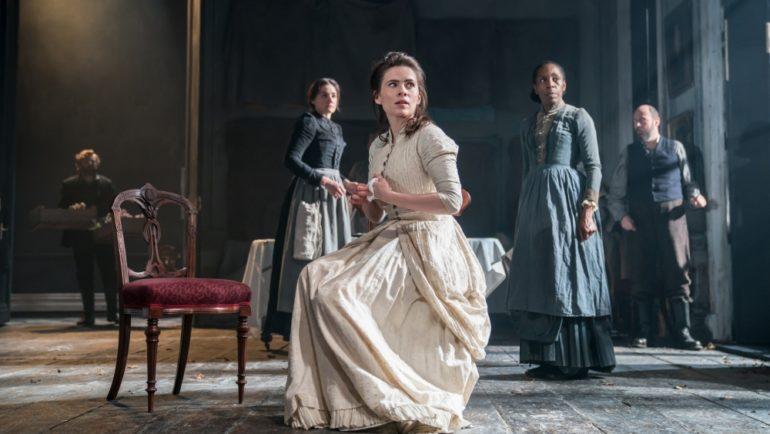West End Review: ‘Rosmersholm’ With Hayley Atwell
By Matt Trueman
LOS ANGELES (Variety.com) – “Rosmersholm” arrives at the end of an era — at least, it does in London. Now playing on the West End, Henrik Ibsen’s dark, dense late play was last seen here back in 2008, as a longstanding left-wing government limped through its last leg, firefighting after the financial crash. Before that, in 1992, it coincided with a creaking conservative machine that had, post-Thatcher, completely run out of ideas. Back in 1978, the whole country was coming apart at the seams. It is a “Break Glass In Case of Emergencies” sort of a play. An alarum drama. Revive “Rosmersholm” for regime change.
It’s not hard to see why. “Rosmersholm” is hungry — no, ravenous — for change and yet, at the same time, incapable of it. Its characters are desperate to throw off the past to which they are inextricably shackled. It weighs them down even as they try to swim away: concrete shoes that just won’t come off. This production’s advertising show two people drowning: Hayley Atwell (“Agent Carter”) and Tom Burke locked in a dead-eyed underwater embrace, romantics right until the end. They look like they’re suspended in formaldehyde, perfectly preserved.
Ibsen’s play takes place against a backdrop of upheaval. Two sides are wrestling to take the town council. The conservative incumbent Andreas Kroll (Giles Terera) is seeking to stave off a radical left-wing revolt stirred up by the local paper and its populist owner Peter Mortensgaard, a man exiled from polite society after an extramarital affair. Both sides are vying to get John Rosmer (Tom Burke) onside — as much for the status of his family name as for his moral position as the town’s priest. His support will swing it. The whole future feels like it hangs in the balance.
Only Rosmer himself has changed — radically so. After his wife’s suicide (she threw herself into the cogs of a watermill, jamming the system of power), he lost his faith and renounced his inherited wealth. The play centers on his household, called Rosmersholm. There’s the ghost of a cross by his bed and his ancestors’ portraits sleep beneath dustsheets. His hands his heirlooms over to his servants. Urged on by the strident Rebecca West (Atwell) — the two are in a deep, but dare-not-be-spoken love — he envisages himself as the town’s moral savior. Where he casts his vote, for stability or resurrection, the town will follow.
What makes “Rosmersholm” so extraordinary is the way it binds the personal to the political. The two are so entangled, they drag each other down. Just as Mortensgaard’s adultery is deemed to discredit his politics, so Rosmer’s own choices curtail his ability to make change. He advocates social reform by adopting a new humanism, but in casting off his faith, he loses the authority to affect it. Rebecca has personal demons of her own, gnawing away at her political standing. Private guilt stains public faces. Ibsen’s play has the moral force of his earlier play “ An Enemy of the People ,” laced with the personal agony of his “ Ghosts .”
Put another way: The past stalks the present, and so scuppers the future. This is a play in which everything has shifted and yet nothing has changed. Ian Rickson’s production recognizes both things at once. Played with a febrile intensity, almost to the point of panic, it never finds a release. It’s like bottled lightning or static electricity, a power surge with nowhere to go. Rae Smith’s design draws that out eloquently, not only turning Rosmersholm itself into a haunted house — high ceilings and heavy shutters, peeling paint and unoccupied chairs — but refining the gesture of a play that opens up only to close back down again. The windows are thrown open, the place dusted down and spruced up with flowers, only for dishevelment to encroach as the daylight fades. Neil Austin casts an orange sunset across the third act like a fire burning itself out. It leaves spotlights licking at oil paintings, bringing old family portraits to life. Rosmersholm’s dark past reclaims the space.
Everyone here is held back by something. Burke’s Rosmer is beautifully ineffectual. Blaming himself for his wife’s death, he’s a man horrified by the idea of having a concrete effect. He’s ultra-rational: able to see both sides of an argument, but forever turning on his heels. Atwell, however, really ups the ante, instilling Rebecca with an urgency that grows more insistent as her hopes for reform ebb away. She restrains her feelings for Rosmer with a saintly determination, only giving into feeling once the possibility of a future has fallen apart. It is devastating: the pair’s love is only possible because of the thing that makes it impossible — Beata’s death.
Duncan Macmillan’s muscular adaptation brings out the play’s various binds with brilliant clarity. His language uncovers contemporary political resonances — the privileges, inequalities and the insistence on purity — in a way that pulls Rickson’s period dress production into limbo, torn between past and present. There’s nothing dusty about it, no buttoned-up formality, no tiptoeing etiquette. Emotionally, it flays the flesh off the play, in large part thanks to Atwell’s excoriating performance. Intellectually, it complexifies its component parts. Terera’s compassionate conservative can talk, fervently, about the importance of community while Peter Wight’s shambling alcoholic lecturer — another free radical constrained by his past — rails loftily for the people. Austin’s lighting, cleverly, casts people in different lights at different times, warm candle glow and cold moon shine, in a reflection of Rosmer’s uncertainty and, indeed, our own.

